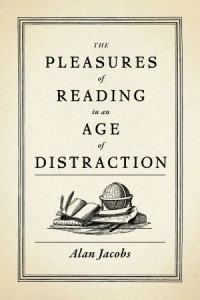The Pleasures of Reading in an Age of Distraction, by Alan Jacobs. Oxford University Press, 2011, 150 pages. Age/interest: adult.


Somewhere on my shelves is a loosely-bound copy of How to Read a Book, by Mortimer Adler. It seemed a good idea at the time: a guide to approaching western literature in all its varieties and forms and getting the most from it in the least possible time. Susan Wise Bauer, in The Well-Educated Mind, addresses some of the same concerns in a similar way. Their advice is sound: understand what kind of work you hold in your hands, scope out the range and method, apply the proper kind of response, ask yourself questions . . . oh, and if you want a well-furnished brain, these are the books you should read.
The problem is that reading is an intensely personal activity in its motivation, method, and reward, and not a matter for authoritative advice. Helpful suggestions, certainly. Wise mentoring, indeed. But “reading strategies” and “essential books” applied across the board can hurt as much as they help. That was the conclusion of no less a stellar reader than C. S. Lewis, in An Experiment in Criticism, and Alan Jacobs expands on the theme. The Pleasures of Reading is anything but a how-to guide; no chapters, no outlines, no bullet points, and especially no lists. He agrees with Lewis that hard-core readers are few—that is, those who get a deep and inimitable pleasure from words artfully arranged in sentences, are in the minority and always will be. He’s writing for those people, especially those who despair that the insane beeps and bleeps and beguilements and bewilderments of contemporary life have robbed them of their ability to get lost in a book.
After a few pages I had to pick up a pencil and start marking quotes (Jacobs shares his own system of notation, but that’s a personal matter, too). Such as “. . . one of the most wonderful things about books is they don’t grow agitated or dismissive. They patiently bear all the scrutiny you choose to give them, and the more carefully you read them the more secrets they yield.” Or this: “The writer Stefan Zweig once defined a book as a ‘handful of silence that assuages torment and unrest.’” How do we capture that silence, in a noisy world?
Jacobs give a lot of space to his notion of “reading at Whim”: seeking out those works that mean the most of you, rather than slavishly plodding through someone else’s list of Great Books. The classics are classic for a reason, but that doesn’t mean they will bestow their blessings on all readers equally. It takes attention to develop a personal great-books canon, and it takes humility to give a book a second chance to grab you. But most of all it takes time.
Jacobs knocks down some current shibboleths, such as that school is the best place to be taught a love of reading. Literature studies (even though he teaches literature at Wheaton) don’t necessarily promote a personal appreciation of literature. What about ereaders? Well, he credits the Kindle with re-kindling his ability to focus, because the screen centered his attention and urged it forward, page after page (I trust him on this; e-readers are a distinct breed from iPads and Tablets, which I consider electronic dens of distraction). His discursions roam far and wide, from the latest science (what happens in the brain when we read) to the medieval treatise on reading as a Christian duty, by Abbot Hugh (Didascalicon).
These few pages are packed; I found some of the most valuable insights in the footnotes. It’s a challenging book, but also a reassuring one, and makes me appreciate even more the great gift of language and the God who fashioned our minds to receive it. Those who are wondering how to foster a love of reading in their children and students won’t find any bullet points, but rather a worthy target to aim at: “Our goal as adults is not to love all books alike, or as few as possible, but rather to love as widely and well as our limited selves will allow.” And that’s a lot.
Alan Jacobs will share some teaching strategies on Tuesday, so you’ll want to come back for that! For more thoughts on how to foster a love of reading in children, see Are You a Book Whisperer? And don’t miss Emily’s interview with Mike Sugimoto on the pros and cons of ereaders.
Stay Up to Date!
Get the information you need to make wise choices about books for your children and teens.
Our weekly newsletter includes our latest reviews, related links from around the web, a featured book list, book trivia, and more. We never sell your information. You may unsubscribe at any time.
Support our writers and help keep Redeemed Reader ad-free by joining the Redeemed Reader Fellowship.
Stay Up to Date!
Get the information you need to make wise choices about books for your children and teens.
Our weekly newsletter includes our latest reviews, related links from around the web, a featured book list, book trivia, and more. We never sell your information. You may unsubscribe at any time.
FREE Bible Guide!
Get a guide to the Best Bibles for Children and Teens. Perfect for an Easter gift.
We'd love to hear from you!
Our comments are now limited to our members (both Silver and Golden Key). Members, you just need to log in with your normal log-in credentials!
Not a member yet? You can join the Silver Key ($2.99/month) for a free 2-week trial. Cancel at any time. Find out more about membership here.
1 Comments
Leave a Comment
You must be logged in to post a comment.


We are a not-for-profit educational organization, founded by Mortimer Adler and we have recently made an exciting discovery–three years after writing the wonderfully expanded third edition of How to Read a Book, Mortimer Adler and Charles Van Doren made a series of thirteen 14-minute videos–lively discussing the art of reading. The videos were produced by Encyclopaedia Britannica. For reasons unknown, sometime after their original publication, these videos were lost.
Three hours with Mortimer Adler and Charles Van Doren, lively discussing the art of reading, on one DVD. A must for libraries and classroom teaching the art of reading.
I cannot exaggerate how instructive these programs are–we are so sure that you will agree, if you are not completely satisfied, we will refund your donation.
Please go here to see a clip and learn more:
https://www.thegreatideas.org/HowToReadABook.htm
ISBN: 978-1-61535-311-8
Thank you,
Max Weismann